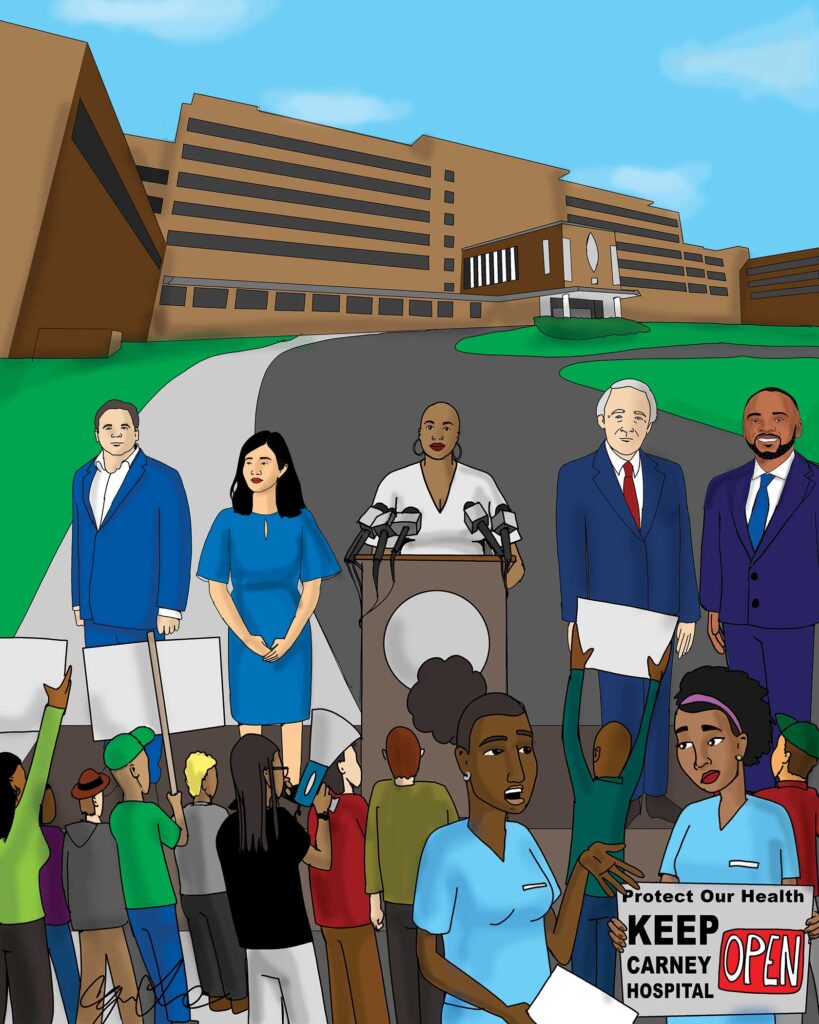
Over the past few years, there has been a tremendous trend in Massachusetts and many states around the country to close needed healthcare facilities. We have seen this trend explode with the bankruptcy filing by Steward Health Care, which has triggered the planned closure of Carney Hospital in Dorchester. First under arms of the Catholic Church and since 2010 under for-profit Steward, Carney has been a community hospital and primary care provider for more than 160 years.
The hospital serves many of the most vulnerable in our community — veterans and their families, the elderly, young mothers and people of color — most from near where the healthcare facility sits between Ashmont and Lower Mills. In a neighborhood that lacks private urgent care facilities, Carney’s emergency room is a relatively efficient provider of outpatient care for a hospital emergency room. You don’t have to spend all day waiting to be seen and treated. The adjoining doctor’s building provides convenient access to medical specialists.
The loss of the hospital would devastate many who rely on its services. Not only that. It is one of the largest employers in what can be broadly defined as Boston’s Black community.
Currently, there are almost 100 patients who would need to be relocated if Steward is allowed to carry out its plan to close the hospital. In addition, more than 1,000 people who rely on Carney for outpatient and primary care would have to find community health centers or other alternatives to fill their health care needs.
This threatened closure has been triggered by Steward’s decision to file bankruptcy, one financial problem that predates the private company’s ownership. As many as 80 % of patients have MassHealth or Medicare, government programs that reimburse hospitals less than private insurers.
But another financial burden was self-inflicted. As the Banner reported a year ago, Steward sold Carney and other hospital buildings to a real estate investment trust in 2016, reaping an unreported profit but saddling itself with lease payments which it has been unable to keep up with.
Stan McLaren, who is Black, became Carney’s CEO after 2021, after a well-regarded tenure as president and CEO of Harvard Street Neighborhood Health Center, also in Dorchester. He told the Banner last summer, “I did not come here for the hospital to close.”
But decisions made above him at the corporate level, like selling the building and leasing it back, have put Carney at risk of that fate. Many public officials question the motivations of Steward executives and their decision, postponed for now by protests, to close Carney.
“This decision driven by Steward’s financial mismanagement and, most of all, greed, is a damming example of how corporate greed in our for-profit healthcare system can devastate our community and put lives at risk,” Congresswoman Ayanna Pressley declared.
She went on to say the planned closure “was a direct result of precise and reckless financial decisions and blatant disregard for the health and well-being of the community.”
In her own statement, Governor Maura Healey said, “It’s regrettable that Ralph de la Torre and Steward’s greed and mismanagement are resulting in the closures of Carney and Nashoba Valley hospitals.” De la Torre is Steward’s CEO. Nashoba Valley in Ayer is another Steward hospital slated for closure.
In that event, government and private officials have been strategizing on how to replace the health care for those served by those hospitals.
“We want to assure the people of Massachusetts that we have prepared diligently for this moment and will take all available steps to help facilitate a smooth transition for impacted patients and employees,” Healey promised.
There may be another way. The Steward case is in bankruptcy court, and it is up to that court to take the side of the community and deny Steward’s motion to close the hospital. Instead, the judge could appoint a receiver to guide the hospital through a restructuring.
It is long overdue that we as a community stand up and require reforms to our health care system so that greed and mismanagement cannot threaten the health of so many. For years, Carney evaded filing financial reports with the state. Going forward, a foolproof way to enforce that mandate needs to be imposed.
At Carney, the staff has been serving the community for decades with compassion and respect. They deserve to work for a company that appreciates their hard work and longstanding commitment to the community. It is a shame that their jobs and hard work are threatened with being cast aside for profit.
Now it is up to the courts to make a stand and choose the community, healthcare and jobs over greed and deny Steward’s request to close Carney. Much like in the similar, recent case of the Edgar Benjamin Healthcare Center, a nursing home on Mission Hill, it’s up to the court to step in and put people over profits.







